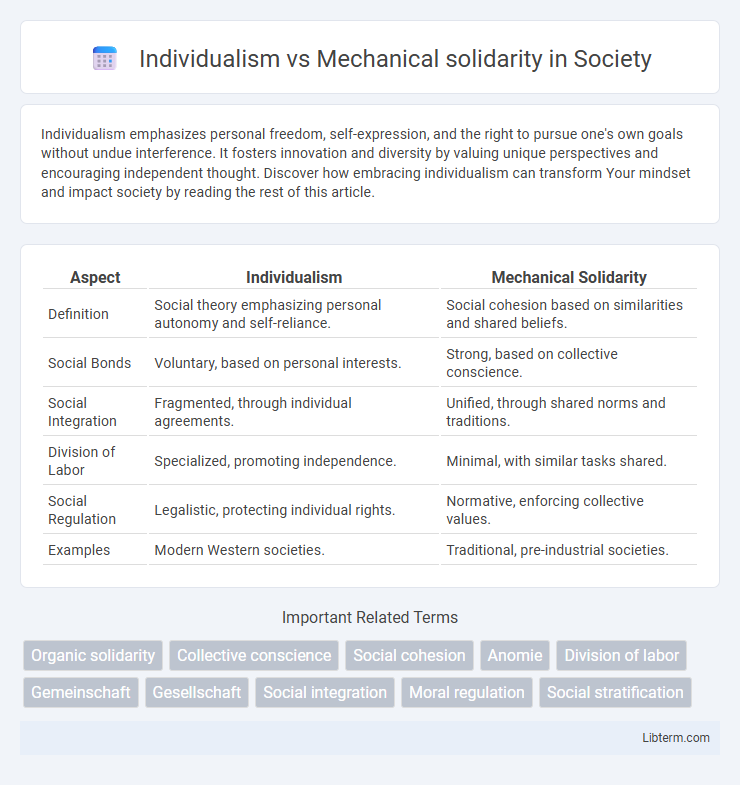Individualism emphasizes personal freedom, self-expression, and the right to pursue one's own goals without undue interference. It fosters innovation and diversity by valuing unique perspectives and encouraging independent thought. Discover how embracing individualism can transform Your mindset and impact society by reading the rest of this article.
Table of Comparison
| Aspect | Individualism | Mechanical Solidarity |
|---|---|---|
| Definition | Social theory emphasizing personal autonomy and self-reliance. | Social cohesion based on similarities and shared beliefs. |
| Social Bonds | Voluntary, based on personal interests. | Strong, based on collective conscience. |
| Social Integration | Fragmented, through individual agreements. | Unified, through shared norms and traditions. |
| Division of Labor | Specialized, promoting independence. | Minimal, with similar tasks shared. |
| Social Regulation | Legalistic, protecting individual rights. | Normative, enforcing collective values. |
| Examples | Modern Western societies. | Traditional, pre-industrial societies. |
Understanding Individualism and Mechanical Solidarity
Individualism emphasizes personal autonomy, self-reliance, and the pursuit of individual goals, fostering social bonds through voluntary associations and diverse interests. Mechanical solidarity arises in traditional societies where cohesion is based on shared beliefs, values, and similar work, creating social integration through uniformity and collective conscience. Understanding the contrast highlights how modern societies rely on individualism and organic solidarity, whereas pre-modern societies depend on mechanical solidarity for social unity.
Historical Origins of Individualism
Individualism emerged during the Enlightenment era, rooted in the philosophical ideas of thinkers like John Locke and Jean-Jacques Rousseau, who emphasized personal liberty, autonomy, and the inherent rights of the individual. This shift paralleled the decline of traditional, community-based bonds characteristic of mechanical solidarity, where cohesion arose from shared beliefs and collective consciousness, as described by Emile Durkheim. The historical origins of individualism reflect the move toward modern societies structured around individual rights, economic competition, and voluntary associations rather than rigid, kin-based social ties.
The Foundations of Mechanical Solidarity
Mechanical solidarity is founded on the homogeneity of individuals who share similar tasks, values, and beliefs, creating a collective conscience that binds society. This form of social cohesion is typical of traditional, small-scale societies where individuals operate as interchangeable parts within a tightly-knit community. The durability of mechanical solidarity relies on shared norms and the collective conscience, allowing social order to persist without extensive legal regulation.
Key Differences: Individualism vs Mechanical Solidarity
Individualism emphasizes personal autonomy, self-reliance, and the pursuit of individual goals, prioritizing distinct identities within society. Mechanical solidarity, rooted in pre-industrial societies, relies on shared beliefs, values, and collective consciousness, fostering social cohesion through homogeneity. The key difference lies in individualism promoting diversity and personal freedom, whereas mechanical solidarity depends on uniformity and social integration.
Sociological Implications of Both Concepts
Individualism promotes personal autonomy and self-expression, fostering diverse social roles but potentially weakening collective cohesion and shared values. Mechanical solidarity, common in traditional societies, relies on homogeneity and collective conscience to maintain social order, emphasizing similarity and strong community bonds. Sociologically, the tension between these concepts influences social integration, with individualism encouraging pluralism and innovation while mechanical solidarity supports stability and social conformity.
Durkheim’s Perspective on Social Cohesion
Durkheim's perspective on social cohesion contrasts individualism with mechanical solidarity, emphasizing that mechanical solidarity binds pre-modern societies through shared beliefs and collective conscience. In contrast, individualism characterizes modern societies, where organic solidarity arises from the interdependence of specialized roles and the recognition of individual autonomy. Durkheim argues that this shift enhances social cohesion by fostering cooperation based on difference rather than similarity.
Modern Society: The Rise of Individualism
Modern society has witnessed a significant shift from mechanical solidarity, characterized by shared beliefs and collective consciousness, to individualism, emphasizing personal autonomy and diverse social roles. This transformation is driven by increased specialization in labor, urbanization, and the decline of traditional community bonds. As a result, social cohesion in contemporary societies depends more on interdependence and legal frameworks than on homogeneity and collective norms.
The Role of Technology in Shaping Solidarity
Technology transforms social cohesion by shifting traditional mechanical solidarity, rooted in shared beliefs and similarities, toward individualism characterized by diverse, specialized roles. Digital platforms and automation foster personalized interactions, weakening collective consciousness but enhancing organic solidarity through interdependence and differentiation. The evolution of technology reshapes social bonds, emphasizing autonomy while requiring complex cooperation to maintain societal stability.
Challenges and Critiques of Each System
Individualism faces challenges such as social fragmentation, weakened communal bonds, and increased feelings of isolation, while mechanical solidarity struggles with rigidity, resistance to change, and the suppression of individual diversity. Critics argue individualism can undermine social cohesion and collective responsibility, whereas mechanical solidarity may inhibit innovation and marginalize non-conforming individuals. Balancing personal autonomy with collective integration remains a key difficulty in reconciling these social frameworks.
Harmonizing Individualism and Solidarity in Contemporary Societies
Harmonizing individualism and mechanical solidarity in contemporary societies requires balancing personal autonomy with collective norms to foster social cohesion. Emphasizing shared values and community rituals strengthens mechanical solidarity, while respecting individual rights promotes autonomy and innovation. Effective social policies integrate these elements by encouraging civic participation and recognizing diverse identities within a unified societal framework.
Individualism Infographic

 libterm.com
libterm.com